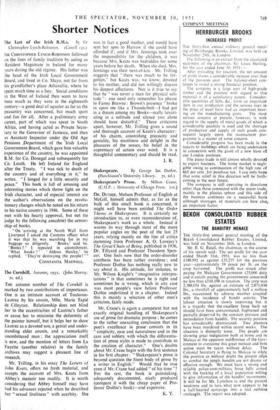Shakespeare. . By George Ian Duthie.
(Hutchinson's University Library. 7s. 6d.)
Shakespeare's Prose. By Milton Crane. (C.U.P. : University of Chicago Press. 2is.) DR. DUTHIE, Molson Professor of English at McGill, himself admits that, as far as the bulk of this small book is concerned, it might well have been entitled The Order Theme in Shakespeare. It is certainly no introduction to, or even reconsideration of, Shakespeare's work as a whole. Instead it worms its way through most of the more popular angles on the poet of the last 25 years, relying mainly on the line of critics stemming from Professor A. 0. Lovejoy's The Great Chain of Being, published in 1936, Dr. Tillyard and Professor Theodore Spen- cer. Orie feels now that the order-disorder antithesis has been rather overdone ; and Professor Duthie has nothing really new to say about it. His attitude, for 'instance, to Mr. Wilson Knight's " imaginative interpre- tations " is that sometimes he is right and sometimes he is wrong, which in any case was most people's view before Professor Duthie underlined it in a chapter. Indeed this is mainly a selectiOn of other men's criticism, fairly made.
Mr. Crane's is again a competent but not exactly original handling of Shakespeare's use of prose for dramatic purpose ; he comes to the rather unexciting conclusion that the poet's excellence in prose consists in its " simplicity, ease and naturalness and in the care and sublety with which the differentia- tion of prose styles is made to contribute to the creation of character." One's doubts about Mr. Crane begin with the first sentence in his first chapter: " Shakespeare's prose is beyond question the finest body of prose by a writer in English." Would that be true even if Mr. Crane had added " of his time "? For the rest, the book is painstaking, adequately documented, nicely produced (compare it with the cheap paper of Pro- fessor Duthie's book)—and expensive.
K. Y.


































 Previous page
Previous page